
Macromolecular Reaction Engineering
Scope & Guideline
Innovating Macromolecular Engineering for Tomorrow
Introduction
Aims and Scopes
- Polymerization Kinetics and Mechanisms:
The journal emphasizes the study of kinetics in various polymerization processes, including free-radical, ionic, and coordination polymerizations, aiming to understand and model the reaction mechanisms and their influence on polymer properties. - Emulsion and Miniemulsion Processes:
A significant focus is placed on emulsion and miniemulsion polymerization techniques, exploring their kinetics, stability, and applications in producing diverse polymeric materials. - Catalytic Polymerization Systems:
Research concerning catalyst systems, including metallocene and Ziegler-Natta catalysts, is a core area of interest, especially regarding their performance and optimization in industrial polymerization settings. - Environmental and Sustainable Polymer Production:
The journal promotes studies on environmentally friendly polymerization methods and the synthesis of bio-based polymers, reflecting a growing trend towards sustainable practices in the field. - Advanced Characterization Techniques:
There is a consistent focus on the development and application of advanced characterization methods for analyzing polymer properties, morphology, and behavior during processing.
Trending and Emerging
- Digital Twins and Real-Time Monitoring:
The integration of digital twin technologies and real-time monitoring systems in polymerization processes is emerging as a critical area of research, allowing for enhanced process control and optimization. - Machine Learning and AI Applications:
The application of machine learning and artificial intelligence in predicting polymer properties and optimizing reaction conditions is gaining traction, indicating a shift towards data-driven methodologies in polymer science. - Sustainable Polymer Chemistry:
There is a marked increase in research focused on sustainable polymer production, including bio-based materials and eco-friendly synthesis methods, aligning with global sustainability goals. - Nanostructured and Functional Polymers:
Emerging interest in the design and application of nanostructured polymers and functional materials for specific applications, such as sensors and drug delivery systems, is becoming more prevalent in recent publications. - Advanced Characterization and Processing Techniques:
Innovative characterization techniques, such as in-situ monitoring and advanced rheological measurements, are becoming increasingly important for understanding polymer behavior during processing and application.
Declining or Waning
- Traditional Solvent-Based Polymerization Methods:
Research on conventional solvent-based polymerization techniques appears to be waning, likely due to the increasing focus on greener, solvent-free processes that minimize environmental impact. - Static Modeling Approaches:
Static or less dynamic modeling approaches for polymerization processes are becoming less common, as the field moves towards more robust, dynamic models that incorporate real-time data and machine learning techniques. - Basic Polymerization Theory:
Papers focused solely on fundamental polymerization theories, without application to real-world processes or materials, are less frequently published, indicating a trend towards more applied and interdisciplinary research.
Similar Journals

Express Polymer Letters
Unleashing Innovation in Polymer ResearchExpress Polymer Letters is a leading open-access journal published by BUDAPEST UNIVERSITY OF TECHNOLOGY AND ECONOMICS, focusing on the fast-paced realm of polymer science and engineering. With a broad scope that encompasses the interdisciplinary fields of Chemical Engineering, Materials Chemistry, and Organic Chemistry, the journal serves as a crucial platform for researchers and professionals dedicated to advancing knowledge and innovation in polymer-related disciplines. Since its inception in 2007, it has consistently provided high-quality, peer-reviewed research and has achieved a respectable impact within various categories, evidenced by its Q2 quartile rankings across multiple Scopus categories and its competitive standings in the field. The journal's dedication to open access ensures that research is widely disseminated, promoting transparency and collaboration within the academic community. Positioned to converge into the future, Express Polymer Letters remains an essential resource for cutting-edge studies and developments, with an anticipated convergence period extending through 2024.
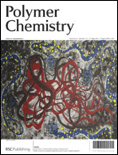
Polymer Chemistry
Catalyzing Discovery in Biomedical and Organic PolymersPolymer Chemistry is a premier peer-reviewed journal published by the Royal Society of Chemistry, focusing on cutting-edge research and developments in the field of polymer science. With its ISSN 1759-9954 and E-ISSN 1759-9962, this journal has established a significant impact within the academic community, as evidenced by its impressive Q1 ranking in areas such as Biomedical Engineering, Organic Chemistry, and Polymers and Plastics. Over its convergence period from 2010 to 2024, Polymer Chemistry has become an essential resource for researchers, professionals, and students, showcasing innovative studies that advance the understanding of polymer behavior and applications. The journal does not currently offer open access, allowing for a traditional but rigorous peer-review process ensuring high-quality publications. For those engaged in the rapidly evolving disciplines of biochemistry and bioengineering, Polymer Chemistry serves as a vital platform for disseminating influential findings and fostering interdisciplinary collaboration in a global context.
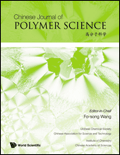
CHINESE JOURNAL OF POLYMER SCIENCE
Advancing Polymer Knowledge for a Sustainable FutureThe CHINESE JOURNAL OF POLYMER SCIENCE, published by SPRINGER, stands as a premier periodical in the realm of polymer science, showcasing cutting-edge research and technological advancements since its inception in 1985. With an impressive impact factor reflecting its significance in the field, this journal is categorized in the top quartiles (Q1) of Chemical Engineering, Organic Chemistry, and Polymers and Plastics. It features a wide spectrum of innovative studies, thus serving as an essential resource for researchers, professionals, and students dedicated to understanding and advancing polymer-related technologies. The journal is indexed in Scopus, with notable rankings that highlight its influence in the disciplines of organic chemistry and materials science, making it a vital communication platform for authors around the globe aiming to disseminate impactful findings. Although not an open-access publication, the journal ensures robust accessibility through institutional subscriptions and partnerships, further emphasizing its commitment to the advancement of polymer science.

ACS Macro Letters
Advancing the Frontiers of Macromolecular ScienceACS Macro Letters, published by the American Chemical Society, is a leading journal in the fields of Inorganic Chemistry, Materials Chemistry, Organic Chemistry, and Polymers and Plastics. Established in 2012, this journal has swiftly ascended to the forefront of chemical research with an impressive reputation, as evidenced by its 2023 Scopus rankings placing it in the first quartile across multiple categories. The journal's objective is to disseminate timely and concise articles that advance the study of macromolecules and their applications, making it an essential resource for researchers, professionals, and students alike. With a focus on fostering innovation and facilitating collaboration within the chemical community, ACS Macro Letters presents a robust platform for scientists to share their groundbreaking findings. Being based in the United States, it serves as a central hub for global discourse in the chemical sciences, although it does not currently offer Open Access options. The journal's commitment to high-quality content is further underscored by its prestigious impact factor and acceptance into elite academic quartiles, signifying its influence and importance in shaping future research.
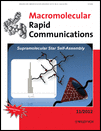
MACROMOLECULAR RAPID COMMUNICATIONS
Accelerating Insights in Macromolecular ScienceMACROMOLECULAR RAPID COMMUNICATIONS, published by WILEY-V C H VERLAG GMBH in Germany, is an esteemed journal dedicated to the rapid dissemination of high-quality research in the fields of materials chemistry, organic chemistry, and polymers and plastics. With a remarkable 2023 impact factor securing its place in the prestigious Q1 category across three key disciplines, the journal ranks impressively within the top quartiles of the Scopus metrics, standing at 36th in organic chemistry and 35th in polymers and plastics. Although the journal does not offer open access options, its informative depth and innovative research make it an invaluable resource for researchers, professionals, and students seeking to stay abreast of the latest developments in macromolecular science. Covering a broad spectrum of topics from fundamental research to applications, MACROMOLECULAR RAPID COMMUNICATIONS aims to foster collaboration and inspire further advancements within the scientific community.
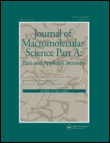
Journal of Macromolecular Science Part A-Pure and Applied Chemistry
Pioneering Research in Pure and Applied ChemistryWelcome to the Journal of Macromolecular Science Part A - Pure and Applied Chemistry, a distinguished publication dedicated to advancing the understanding of macromolecular science, encompassing critical areas such as polymers, materials chemistry, and composites. Published by Taylor & Francis Inc, this journal has firmly established its place within the scientific community, evident from its ranking in the Q2 and Q3 quartiles across various categories in the latest assessments, including Polymers and Plastics as well as Ceramics and Composites. With a commitment to providing high-quality peer-reviewed content, the journal aims to facilitate knowledge exchange and innovation among researchers and practitioners from around the globe. The absence of open access underscores the journal's commitment to maintaining rigorous editorial standards while remaining accessible to its readership. As the journal converges through valuable research contributions from 1992 to 2024, it continues to be a pivotal resource for professionals and students seeking to explore the latest advancements and applications in the field of macromolecular science.
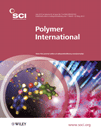
POLYMER INTERNATIONAL
Driving Excellence in Polymer ResearchPOLYMER INTERNATIONAL is a leading journal in the field of polymer science, published by Wiley, one of the most esteemed scholarly publishers. With an ISSN of 0959-8103 and an E-ISSN of 1097-0126, this journal has been a pivotal platform for researchers since its inception in 1991, now extending its coverage until 2024. The journal boasts a commendable standing in various scientific domains, achieving a Q2 quartile ranking in Materials Chemistry, Organic Chemistry, and Polymers and Plastics as of 2023. Additionally, it holds impressive Scopus ranks, including Rank #47 in Organic Chemistry and Rank #40 in Polymers and Plastics, placing it within the top percentiles of its categories. Researchers, professionals, and students alike can benefit from its rich array of articles that contribute to the understanding and advancement of polymer technology and materials science. Although not an open access journal, POLYMER INTERNATIONAL remains crucial for disseminating high-quality research that drives innovation and development within the field.
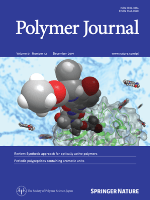
POLYMER JOURNAL
Elevating Knowledge in the World of PolymersPOLYMER JOURNAL, published by SpringerNature in the United Kingdom, is a premier academic platform dedicated to the field of polymer science. Since its inception in 1971, this journal has become an essential resource for researchers and professionals interested in the latest advancements in materials chemistry, polymers, and plastics. With its robust H-index and a consistent ranking in the top quartiles of its categories—Q2 in both Materials Chemistry and Polymers and Plastics—POLYMER JOURNAL demonstrates a strong impact in the scientific community. It holds significant recognition in Scopus rankings, occupying the 68th percentile in Materials Chemistry and the 67th percentile in Polymers and Plastics. The journal's commitment to publishing high-quality research articles enables it to serve as a key reference point for innovative studies, theoretical developments, and practical applications in polymer science. Although it is not an open-access journal, researchers and students gain valuable insights through its extensive archives and rigorous peer-reviewed content, making POLYMER JOURNAL a vital source of knowledge for anyone engaged in this dynamic field.

DESIGNED MONOMERS AND POLYMERS
Connecting researchers with the latest in polymer innovations.Designed Monomers and Polymers is a prestigious open-access journal published by Taylor & Francis Ltd, dedicated to advancing the field of chemical and material sciences. Since its inception in 1998, the journal has provided a vital platform for disseminating innovative research on the synthesis and applications of monomers and polymers. With a current impact factor reflecting its growing relevance, it falls within the Q3 category across multiple domains, including Chemical Engineering, Chemistry, and Materials Science, making it a valuable resource for researchers and professionals seeking to stay at the forefront of material innovation. Operating from the United Kingdom, the journal emphasizes accessibility, having adopted an Open Access model since 2016, allowing wider distribution and utilization of its published content. Researchers, students, and industry professionals are encouraged to explore its comprehensive articles that contribute to the ongoing dialogue in polymer science, fostering advancements that can lead to real-world applications and technological progression.

JOURNAL OF POLYMER RESEARCH
Empowering Discoveries in Polymer ResearchJOURNAL OF POLYMER RESEARCH is a leading peer-reviewed journal published by SPRINGER, specializing in the dynamic fields of polymer science, materials chemistry, and organic chemistry. Operating since 1994, this esteemed journal has consistently delivered high-quality research articles that illuminate the latest advancements and innovations in polymer technology. With an increasing impact factor and placed in the Q2 category for both Materials Chemistry and Polymers and Plastics, it stands as a valuable resource for researchers, professionals, and students seeking cutting-edge knowledge in these areas. The journal is indexed in Scopus, highlighting its significance in the academic community, with notable rankings in Materials Science and Organic Chemistry. While it does not currently offer open access options, the meticulous selection of research and thorough peer-review process ensures each article's contribution to the field is both robust and impactful. Researchers aiming to expand their understanding and engage with pioneering studies will find JOURNAL OF POLYMER RESEARCH an indispensable platform.